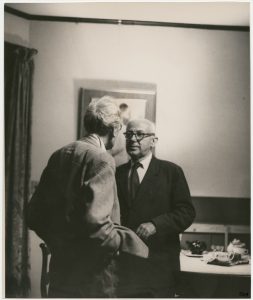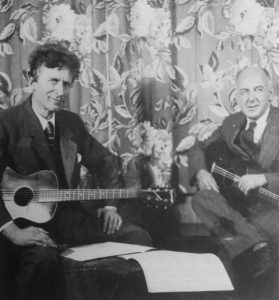I was surprised when I first started reading about the friendship between Henry Cowell and Percy Grainger. My understanding of Cowell was that he was an abrasive, noisy ultra-modernist, while Grainger was a pleasant, folksongy writer of band music. It seemed like these men had nothing in common. I was surprised to learn that they had a remarkable amount in common. To begin with, both had a reputation for their treatment of the piano. Cowell’s for his use of extended technique, and Grainger for his wild virtuosity. Both were considered geniuses, each with a deep interest in researching and analyzing music of other cultures. Both men often taught classes or guest lectured, which is how they ended up meeting each other.
The two first met on January 17th of 1933, when Cowell was giving a lecture at NYU. Grainger was so impressed, he attended another lecture of his two weeks later. The two talked and agreed to meet to show each other their compositions and field recordings of folk music. After a successful ‘show and tell’ of sorts, they decided to remain in touch, marking the beginning of their correspondence. After their first meeting, Cowell wrote to Grainger
“I am still in a rare state of excitement and delight at having contact with you today, and finding that you are so enthusiastic over the same things that I am!”
Grainger responded to this by writing
“The more I think about it the more I am amazed by the beauty , purity & charm of your epochmaking experi- ments as a composer, & the sanity & balance of yr attitude as a student of worldwide music”
The men continued writing letters for a year or so, and gave guest lectures at each other’s classes. The two temporarily lost communication in 1934 when Grainger moved to Australia for some time. From 1934 to 1937, there was no correspondence between the two. When Grainger mailed Cowell’s journal to receive Cowell’s mailing address, he was shocked to learn that Cowell had been sent to prison. In 1936, Cowell was sent to San Quentin Prison for having sex with an underage male. This did not stop the friendship between the two. Between 1937 and Cowell’s release in 1940, they exchanged over 100 letters with one another. Eventually, Grainger wrote to Cowell saying that once he got out of prison, he wanted Cowell to become his personal secretary, and the two men could research music together. Cowell joyfully accepted, writing
“What a wonderful opportunity you and your wife offer me! I have no words to express myself with…To go to the islands to ‘get away from it all’ is one thing; but I should like to go there to get into it all”
Thanks to Grainger’s pressure on the Prison board, and for sponsoring Cowell’s parole, Cowell was released from prison in 1940 and moved to Grainger’s house in the Cook Islands. Once there, it was Cowell’s job to preserve Grainger’s archive of wax cylinders, scores, letters, manuscripts, pictures, drawings, and writings.
During this time, Cowell was also experimenting with composition, and played with Grainger’s massive collection of exotic folk instruments. Because of financial strains, Cowell’s employment was mutually terminated in 1941. The two remained friends, occasionally exchanging letters until Grainger’s death in 1961.
Sources
Henry Cowell Web Site. Accessed November 07, 2017. http://www.henrycowell.org/hc/hcbiography.cfm
Music Division, The New York Public Library. “Henry Cowell and Percy Grainger” New York Public Library Digital Collections. Accessed November 7, 2017. http://digitalcollections.nypl.org/items/af9775e0-05fa-0132-27d3-58d385a7b928
Robinson, Suzanne. “Percy Grainger and Henry Cowell: Concurrences Between Two “Hyper-Moderns”.” The Musical Quarterly 94, no. 3 (2011): 278-324. http://www.jstor.org/stable/41289209.


